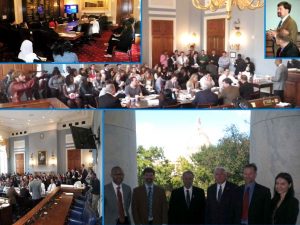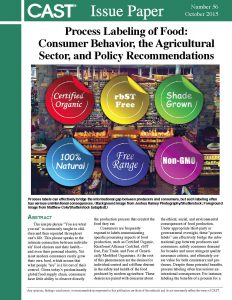Watch the webinar “HPAI and Its Impact on Food Production Industries”

UPDATE (press release below): On Monday, October 5, CAST organized three gatherings in Washington, D.C., to present thoughtful, timely findings from its new issue paper about process labeling on food packaging.
Two sessions occurred on Capitol Hill (Senate staffers at 10:00 and House staffers at noon). CAST EVP Kent Schescke introduced Kent Messer (Univ. of Delaware) who provided key information about material in the research paper. In addition, the National Corn Growers Association sponsored Kevin Folta (Univ. of Florida) at the events. Folta’s topic was “how social media can misrepresent food science.” Professor Messer was the dynamic task force chair for the research paper, and Professor Folta is a well-known advocate of science-based innovation in agriculture. Tom Van Arsdall and the National Coalition for Food and Agricultural Research helped organize the event.
The afternoon session occurred at the Grocery Manufacturers of America headquarters. CAST President-Elect Mark Armfelt introduced the event that included an overview from Dr. Messer and a panel discussion led by the International Food Information Council.
October 2015…Council for Agricultural Science and Technology, Ames, Iowa.
Consumers are exposed to a barrage of food labels, and the results are mixed. While some consumers gain useful information, for others the label may as well say “certified confusing.” The authors of this timely issue paper provide needed clarity about the labeling controversy. They examine what is known regarding consumer reactions to process labels; they identify the legal framework for process labeling; and they provide policy recommendations that highlight the pros and cons of labels.
As stated in the paper, “Process labels can effectively bridge the informational gap between producers and consumers.” They increase consumer choices, open new markets, and help remove harmful ingredients from the food we eat. Consumers feel more connected and more able to make informed decisions.
Problems arise when process labels are subject to consumer interpretation. Are products really “healthier, safer, and more environmentally friendly”? Opinion can override credible science, and the consequences might include increased food prices and the stunting of technological advances in agriculture.
 While some people call for a ban on process labels, these experts explain why that would be a bad idea. Labels can be good for consumers and producers alike, but the food industry and government officials should keep key points in mind:
While some people call for a ban on process labels, these experts explain why that would be a bad idea. Labels can be good for consumers and producers alike, but the food industry and government officials should keep key points in mind:
The adage “you are what you eat” has become “you are what you think you eat,” as consumers struggle to interpret food labels. The authors of this paper explain how producers can eliminate confusion and turn the phrase into “you are what you know you eat.” Next-generation labels should be clear, science based, and consumer friendly.
Task Force Authors:
Kent D. Messer (Chair), University of Delaware
Shawna Bligh, Evans & Dixon LLC
Marco Costanigro, Colorado State University
Harry M. Kaiser, Cornell University
CAST Issue Paper 56 and its companion Ag quickCAST are available online at the CAST website, www.cast-science.org, along with many of CAST’s other scientific publications. All CAST Issue Papers, Commentaries, and Ag quickCASTs are FREE.
CAST is an international consortium of scientific and professional societies, companies, and nonprofit organizations. It assembles, interprets, and communicates credible science-based information regionally, nationally, and internationally to legislators, regulators, policymakers, the media, the private sector, and the public.
Contacts for this Issue Paper:
Kent D. Messer–Phone: 302-831-1316; E-mail: messer@udel.edu
Kent Schescke–Phone: 515-292-2125, ext. 231; E-mail: kschescke@cast-science.org
Your donation to CAST helps support the CAST mission of communicating science to meet the challenge of producing enough food, fiber and fuel for a growing population. Every gift, no matter the size, is appreciated.